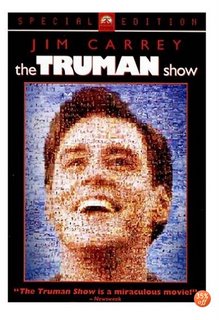
Frank Darabont’s The Shawshank Redemption (1994) has just been voted the Greatest Movie of All Time by readers of Empire magazine. Its ineffable and peerless mix of emotion, sentiment - and that jaw-dropping final act – has quickly established the movie as a modern popular and critical favourite.
However, there is another 1990s movie that has consistently proven itself to be the most timely and eerily perspicacious piece of film-making of the last 15 years. That movie is Antipodean director Peter Weir’s The Truman Show (1998). Weir, working from Andrew Niccols’ script, crafted an intelligent and profoundly moving and repercussive film with thematic preoccupations of media manipulation that foreshadowed the biggest media phenomenon of this generation: reality television.
For that reason, I argue that The Truman Show deserves the title of Movie of the Decade for the 1990s.
The Truman Show was science fiction when it was released in the autumn of 1998. Truman Burbank (an astonishing Jim Carrey) is the oblivious star of the biggest TV show on earth. His idyllic seaside town is in fact a giant television studio. The sun and moon in the sky is actually the control station from where the Christof the Creator (loaded name or what?) controls everything from the traffic lights to the weather. Christof (an Oscar nominated performance from Ed Harris) adopted Truman as a baby and built the goldfish bowl studio-town, installing thousands of secret cameras to endlessly broadcast Truman’s every move.
All of his family and friends are actors. His wife Meryl (Laura Linney) is an actress. The town’s population are all extras. One day, a fallen studio light alerts Truman’s suspicions and, as the terrible truth begins to dawn on him, he tries to devise a way to escape from his false world without anybody noticing – not an easy task when Christof and a fan base of 1 billion are watching your every move.
At the time, The Truman Show was acclaimed for its brilliant attempt to distil modern day paranoia and for its allegorical discussion on religion and philosophy. It only received three Oscar nominations (for Weir, Niccols and Harris), despite being touted as a possible Best Picture winner. Little did we know, that within a year, Dutch television would incarnate the premise of the movie and give rise to a media behemoth that has since then sought new and ever more bizarre ways to outdo their competition’s latest excess.
Since 2000, Big Brother has meiotically produced every imaginable reality TV spin-off, where regular people (and now “celebrities”) put themselves at the mercy of the public as they seek your vote to become a popstar, a TV host, a model or just to stay a part of the game. Anyone who thought that reality television was on the decline will surely have to revise that opinion in light of the astounding success of this years’ Celebrity Big Brother, a show that was unanimously decreed to be a Rorschach Test for our modern culture but that’s another matter.
Reality TV has come close to realising the presentiments offered in The Truman Show before– for instance, the disturbing clamour by execs for their show to be the one with the first on-air copulation and, even worse, birth, was a stated objective of Christof and Meryl in Weir’s movie. But this year, the powers-that-be decided to forever erase the line between ‘celebrity’ and ‘nobody’, a divide that reality television has been bridging slowly but surely for the last few years anyway. Chantelle, a Paris Hilton clone, was a mere promotions girl three weeks ago. Now she is the most famous woman in Britain. And she’s famous now because she wasn’t famous then.
Cultural Studies boffins will be producing theses about this year’s show for a long time to come. Just as Christof had the vision to place a nobody before the cameras and turn him into an (albeit unwitting) superstar just for being ordinary, Endemol productions decided to mock the very notion of celebrity by quietly placing a ‘nobody’ amongst the groundlessly self-important egos of washed-up has-beens and bitter almost-rans. Even when Chantelle’s housemates cottoned on that she wasn’t a celebrity, she was still ranked by those housemates as being more famous than at least two others in the house. I mean, it’s genius!
Just as The Truman Show’s ratings go through the roof as viewers tune in to see how their protagonist will escape, Celebrity Big Brother metastasised into a cross-media sensation, when it became clear that the ‘nobody’ stood a strong chance of snatching the victory laurel from the waiting heads of the physically, mentally and emotionally damaged gaggle of celebrities on offer in the televisual bell jar.
CBB marked a turning point in the development of reality television. In many ways, it’s a fitting bookend to a self-reflexive discourse that was started by The Truman Show almost eight years ago. Truman prefigured reality television in its most basic yet (at the time) extreme form. It was a media satire about what the next great hook will be to keep viewers and advertisers salivating.
Truman unknowingly gave us signposts as to where television was heading – how there was nothing left to put on television only ordinary people and to distort their realities in every way imaginable so as to both keep them under control and to satisfy our benighted and voyeuristic urges. Celebrities are not immune from this anymore.
Celebrities are nobodies and nobodies are celebrities. That is where Celebrity Big Brother has taken us to. Where to next? What variant of The Truman Show will all the young Christofs devise next? God only knows. Until then, behold the new phenomenon that is the Celebody – the Celebrity Nobody.

No comments:
Post a Comment